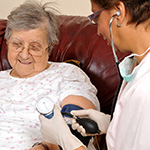Forms / Advance Directives
Planning ahead and making your end-of-life care wishes known often involves important discussions and executing advance directives. Each state has different policies for enabling individuals to guide advanced illness or end-of-life care. Below is a summary of the New York State policies.
The New York Health Care Proxy Law established a form that allows you to appoint someone you trust as a health care agent to make treatment decisions for you if you lose the ability to make decisions yourself. The form provides space for you to specify the types of treatments you want or don’t want and must be signed before two adult witnesses. Your appointed agent must follow these instructions.
For more information on the New York Health Care Proxy Law, visit the New York Department of Health website. These forms are available in various languages: English, Spanish, Chinese and Russian.
You can find links to halachic medical forms below.
- Jewish Medical Directives for Health Care, approved by the Rabbinical Assembly of the Conservative Movement
- Chayim Aruchim Medical Directives
- The Halachic Medical Directive for use in New York State
Please note that New York does not specifically recognize living wills separate from a health proxy. Thus, a living will or other such document by itself may or may not help in determining your treatment wishes in New York.
The Family Health Care Decisions Act authorizes surrogate decision-makers for patients 18 years and older in hospitals or nursing homes who do not have a health care proxy or legal guardian and who never provided evidence of their treatment wishes. The law establishes a prioritized list of who may be appointed as a surrogate to make decisions regarding withholding life-sustaining treatment. Highest priority goes to a spouse or domestic partner, then to an adult child, parent, adult sibling or a close friend. The law requires surrogates to take the patient’s religious and moral beliefs and best interests into consideration. A living will can help the appointed surrogate understand the patient’s wishes.
Medical Orders for Life Sustaining Treatment (MOLST) allows a physician to issue orders related to life-sustaining treatment, including cardiopulmonary resuscitation (CPR), for hospital patients and nursing home residents, based on the patient’s condition, values and wishes. The MOLST follows the patient if they are transferred or moved to a different treatment setting. The MOLST form is available at the NY Department of Health website and more information is available here.
Nonhospital Do Not Resuscitate Orders provide direction to emergency medical services, home care, hospice and hospital emergency services personnel related to whether to withhold cardiopulmonary resuscitation (CPR). They must be signed by a physician. The English and Spanish versions of the form are available here.
The Palliative Care Patient Information Act and Palliative Care Access Act require health care practitioners and programs to offer information and counseling on options for palliative and hospice care and to facilitate access to palliative care for patients with advanced life-limiting conditions and illnesses. The information can be provided in person or by referral or transfer to another appropriate practitioner. If the patient lacks capacity to make an informed choice, the attending physician is required to provide the information to the patient’s health care proxy or surrogate.
Information on the Palliative Care Patient Information Act and Palliative Care Access Act is available at the New York Department of Health website.
New York State authorizes pediatric palliative care services to Care at Home I & II Medicaid waiver patients. This includes disabled children who require nursing home or hospital level of care and whose families would not otherwise qualify for Medicaid.





